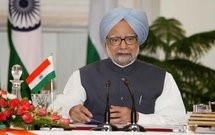 Prime Minister Manmohan Singh left for the 8th G-20 summit a distinctly worried man. With India in the throes of an economic crisis, directly under his watch, Singh will stress on balancing the anomalies in the world economy that, while helping to stabilise the economies of the industrialized world, have left the emerging economies battered.
Prime Minister Manmohan Singh left for the 8th G-20 summit a distinctly worried man. With India in the throes of an economic crisis, directly under his watch, Singh will stress on balancing the anomalies in the world economy that, while helping to stabilise the economies of the industrialized world, have left the emerging economies battered.
In a statement prior to his departure for St Petersburg on Wednesday Singh said, “Though there are encouraging signs of growth in industrialized countries, there is also a slowdown in emerging economies, which are facing the adverse impact of significant capital outflows.” Therefore, “I will emphasize in St. Petersburg the need for an orderly exit from the unconventional monetary policies being pursued by the developed world for the last few years, so as to avoid damaging the growth prospects of the developing world,” the PM said.
What will not help is the other worrisome factor that will be at centre-stage in St Petersburg : the looming war cloud over Syria. With US President Barack Obama planning to pitch strongly among the summiteers for greater cohesion and unity in “punishing” the Syrian regime of Bashar al-Assad for allegedly carrying out chemical gas attacks on Syrians, the prospects of a wider conflagration and subsequent chaos could have a devastating impact on the global economy. Spiralling crude oil prices are further threatening to hit the emerging oil-importing economies, including India.
India is clear it will not support any unilateral US strike on Syria. Any such attacks could further aggravate the volatile situation there.
“I don’t think we can support any action that is not endorsed by the UN,” External Affairs Minister Salman Khurshid said. "India is committed to the UN as the best and only way of addressing conflict situations. When UN acts, we are willing to take decisions that are adverse to our friends as well,” Khurshid said, reacting to the threat of US strikes on Syria.
While any reported use of chemical weapons on citizens is "completely unacceptable and extremely tragic," Khurshid said, “I am hoping that sanity will prevail and that people will step away from actions that could escalate matters.”
‘The situation in Syria is critical. We are keeping a close watch and are in touch with our mission. We have lines of credit and various investments that would come under a question if there is a war-like situation,” Khurshid said, while admitting that “there isn’t much that we can do directly.”
West Asia is home to over six million Indians and a vital source of crude oil, making it a critical region for India, which is dependent on imports for almost 80 per cent of its crude oil requirements. While Syria has no crude oil reserves, unlike Libya, any imposed military strikes can widen the festering conflict, which has pitted rebels and groups affiliated to terrorist groups like Al Qaeda against the Assad regime.
India is also clear that no military solution can work.
“India has consistently called upon all sides to abjure violence so that conditions can be created for an inclusive political dialogue leading to a comprehensive political solution, taking into account the legitimate aspirations of the Syrian people,” foreign ministry spokesman Syed Akbaruddin said. “There can be no military solution to this conflict.”
He said India continues to support the proposed ‘International Conference on Syria’ (Geneva-II), being the best prospect for a political solution, for bringing the Syrian government and the Opposition to the negotiating table.
India, he said, would await the final results of the United Nations inspection before taking a call on the alleged use of chemical weapons by the Syrian government.
“On use of chemical weapons in Syria, India has consistently supported the complete destruction and elimination of chemical weapons worldwide. The international legal norm against the use of chemical weapons anywhere and by anyone should not be breached. However, we will prefer to await the full results of the UN inspection,” Akbaruddin said
However, if UN inspectors provide credible evidence that Assad’s government actually used chemical weapons against its citizens —the “red line” that Obama had said last year if crossed would prompt America to react — India would perforce “rethink” its position.
While it generally does not support imposed military solutions, New Delhi did support the French-led military action in Mali, to oust the terrorist groups that were threatening to overthrow the government.
India, meanwhile, has asked all its (30) citizens, including families of diplomats, to leave Syria and has issued an advisory warning people against visiting the country.
Earlier this year, public sector Oil and Natural Gas Corporation also withdrew from a pact it had struck with China to explore Syrian oil fields, citing the violence there.
"Right now, we think it is an extremely complicated situation, the immediate point of concern is...whether and to what extent, (with) whose active involvement have the chemical attacks taken place," Khurshid said.
Over the next few days, the summiteers at St Petersburg, where Obama will make a pitch for military strikes, while Russian President Vladimir Putin will strongly defend his ally, Assad, are likely to have to negotiate a very fine line.